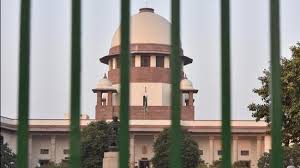That the courts below fell into error in not appreciating that the prosecution failed to discharge the burden of proof, with respect to the victim’s age. Reference was made to Section 34 of the POCSO Act and Section 94 of the Juvenile Justice (Care and Protection of Children) Act, 2015 (hereafter “JJ Act”), to say that age determination has to be on the basis of settled statutory criteria. In the first instance, the school leaving certificate, or the matriculation certificate had to be seen; if that were not available, the birth certificate or records to that effect issued by the local or municipal authority are to be considered, and if neither of the first two classes of documents are available, then, age determination depends on the ossification test. Learned counsel highlighted that in the present case, the ossification test indicated that M’s age was between 18 and 20, proving that she was not a minor. This aspect was deposed to by PW-9, who also produced the test report. (Para 8)
It is evident from conjoint reading of the above provisions that wherever the dispute with respect to the age of a person arises in the context of her or him being a victim under the POCSO Act, the courts have to take recourse to the steps indicated in Section 94 of the JJ Act. The three documents in order of which the Juvenile Justice Act requires consideration is that the concerned court has to determine the age by considering the following documents:
“(i) the date of birth certificate from the school, or the matriculation or equivalent certificate from the concerned examination Board, if available; and in the absence thereof;
(ii) the birth certificate given by a corporation or a municipal authority or a panchayat;
(iii) and only in the absence of (i) and (ii) above, age shall be determined by an ossification test or any other latest medical age determination test conducted on the orders of the Committee or the Board”. (Para 13)
The burden is always upon the prosecution to establish what it alleges; therefore, the prosecution could not have been fallen back upon a document which it had never relied upon. Furthermore, DW-3, the concerned Revenue Official (Deputy Tahsildar) had stated on oath that the records for the year 1997 in respect to the births and deaths were missing. Since it did not answer to the description of any class of documents mentioned in Section 94(2)(i) as it was a mere transfer certificate, Ex C-1 could not have been relied upon to hold that M was below 18 years at the time of commission of the offence. (Para 14)
In her statement under Section 164 of the Cr. PC, the victim M had deposed that she was in love with the appellant, had consumed poison, and had even been hospitalized because she was adamant to live with the appellant. No doubt, she resiled from her statement. Yet, the medical evidence (deposition of PW-11, Dr. Kavitha) indicated that the victim had a ruptured hymen; there was no external injury at her private parts, and that according to her “48 hours before medical examination there was no evidence to show that she had sexual assault is the opinion given by me.” (Para 21)
The court is of the opinion that M’s statement under Section 164 of the Cr. PC contained a truthful narration of the events. This, in other words, meant that there was no penetrative sexual assault on her. Therefore, the provisions of the POCSO Act will not be applicable in this case. The impugned judgment set aside the charge under Section 366 IPC against the appellant. The charges against him, under Section 6 of the POCSO Act as well as Section 10 of the Prohibition of Child Marriage Act, cannot be sustained; the findings of the courts below, i.e., conviction and sentences imposed are, therefore, set aside. (Para 22)
SUPREME COURT JUDGMENT
Citation: 2023 STPL(Web) 70 SC
YUVAPRAKASH Vs. STATE REP. BY INSPECTOR OF POLICE
Criminal Appeal No(S). 1898 of 2023-Decided on 18-7-2023
Click to See Full Text of Judgment: 2023 STPL(Web) 70 SC







